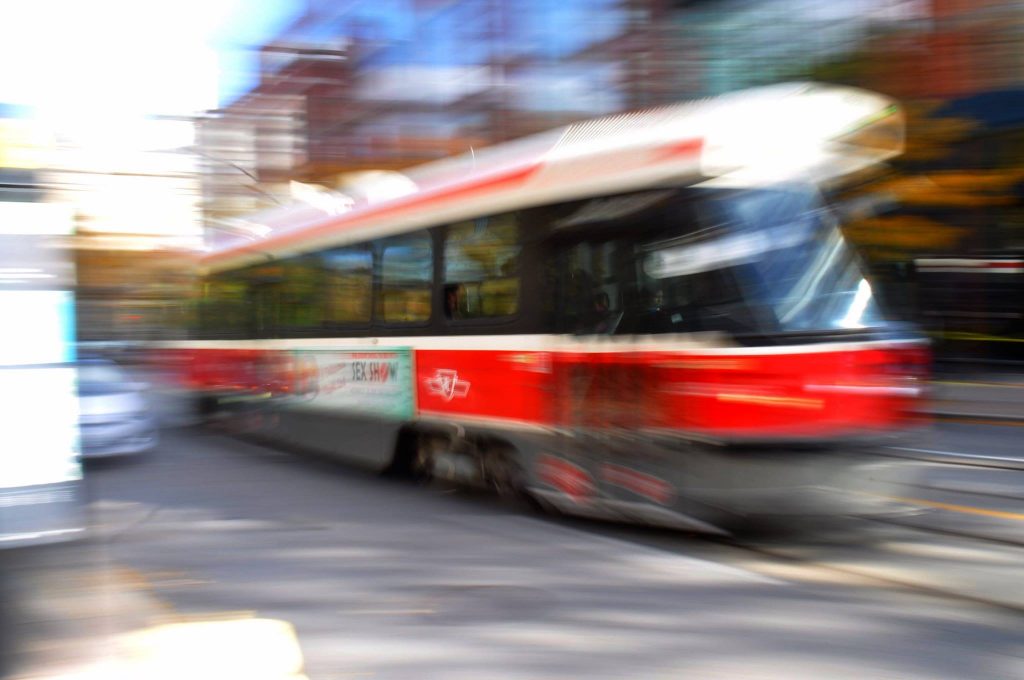

News
Health & Safety
Toronto Public Health report urges TTC to take action on subway air quality in wake of worker’s complaint
By Shawn Jeffords/The Canadian Press
 A TTC streetcar rolls down King Street in Toronto. (Todd Humber/Talent Canada)
A TTC streetcar rolls down King Street in Toronto. (Todd Humber/Talent Canada) Toronto’s subway system contains elevated levels of air pollutants that must be addressed, the city’s chief medical officer said in a new report on Monday while assuring passengers it continues to be safe to ride.
Dr. Eileen de Villa is recommending the Toronto Transit Commission take action to improve air quality after an independent assessment ordered by the city’s public health unit found elevated levels of particulate matter.
Further study must be done to determine the impact on passengers, de Villa writes in her report to the Toronto Board of Health, adding it is still safe to ride the subway.
“Taking the subway is associated with benefits to people’s health and well-being and is a health-supportive way to travel, especially as an alternative to personal vehicle use,” de Villa said.
The board of health asked for the air quality study in 2017 to determine the health impacts for passengers in the subway system.
At the time, Board of Health chairman Joe Mihevc requested the report on so-called “rail dust,” which he said studies had determined was created largely from “steel-on-steel grinding between the subway car wheels and the track.”
That assessment, released Monday with de Villa’s report, notes that particulate matter in the subway is comprised of higher concentrations of metals such as arsenic, cadmium and chromium, than what’s found in outdoor air.
It also notes that health impacts from exposure to subway PM2.5 are higher on Line 2, the Bloor-Danforth portion of the system, because of the length of time passengers spend on the trains and platforms.
However, De Villa notes there are no health-based standards to assess passenger risk from the specific particulate matter in the subway system, and more work must be done to determine the impacts.
“Overall, the results of the assessment indicate that levels of PM2.5 and several of its metal components are high enough to warrant mitigation,” she said.
TTC spokesman Stuart Green said the agency has taken action to address air quality over the past three decades, including the introduction of new vehicles and improved ventilation and filtration systems.
Subway air quality testing shows the TTC is well below provincially mandated occupational health regulations, but protective equipment is supplied to a small group of employees, he added in a statement.
“We remain fully committed to continuing our world-leading efforts in subway air quality improvement by monitoring the effectiveness of our actions to date,” Green said.
The chairman of the Toronto Board of Health said the report shows there is room to improve air quality in the subway, but the service remains safe.
“If there is a message for Torontonians to take away, it’s that riding the TTC is the healthier way,” Coun. Joe Cressy said.
Toronto Mayor John Tory said air quality is an issue every subway system around the world is working to address.
“I am committed to making sure the TTC continues this work in the existing system and in all future subway projects,” he said in a statement.
The Amalgamated Transit Union, which represents TTC employees, slammed the report for not examining the health impact of exposure to workers.
“If the conditions in the subway require many kinds of mitigation for passengers, any reasonable person has to be deeply concerned about what this means for anyone who works there,” said ATU Local 113 president Carlos Santos.
The report comes weeks after a retired worker with the Toronto Transit Commission launched a court case against the agency, alleging it violated the province’s Environmental Protection Act by allowing harmful contaminants into the city’s subway system.
The Ontario NDP’s transit critic said improving air quality in the subway system will require investment and she urged the Progressive Conservative government to commit the required funds.
“There are measures the TTC can take to improve air quality but it involves funding,” Jessica Bell said. “As a provincial politician, I’m concerned about how the province should be providing its fair share to the TTC.”
Print this page